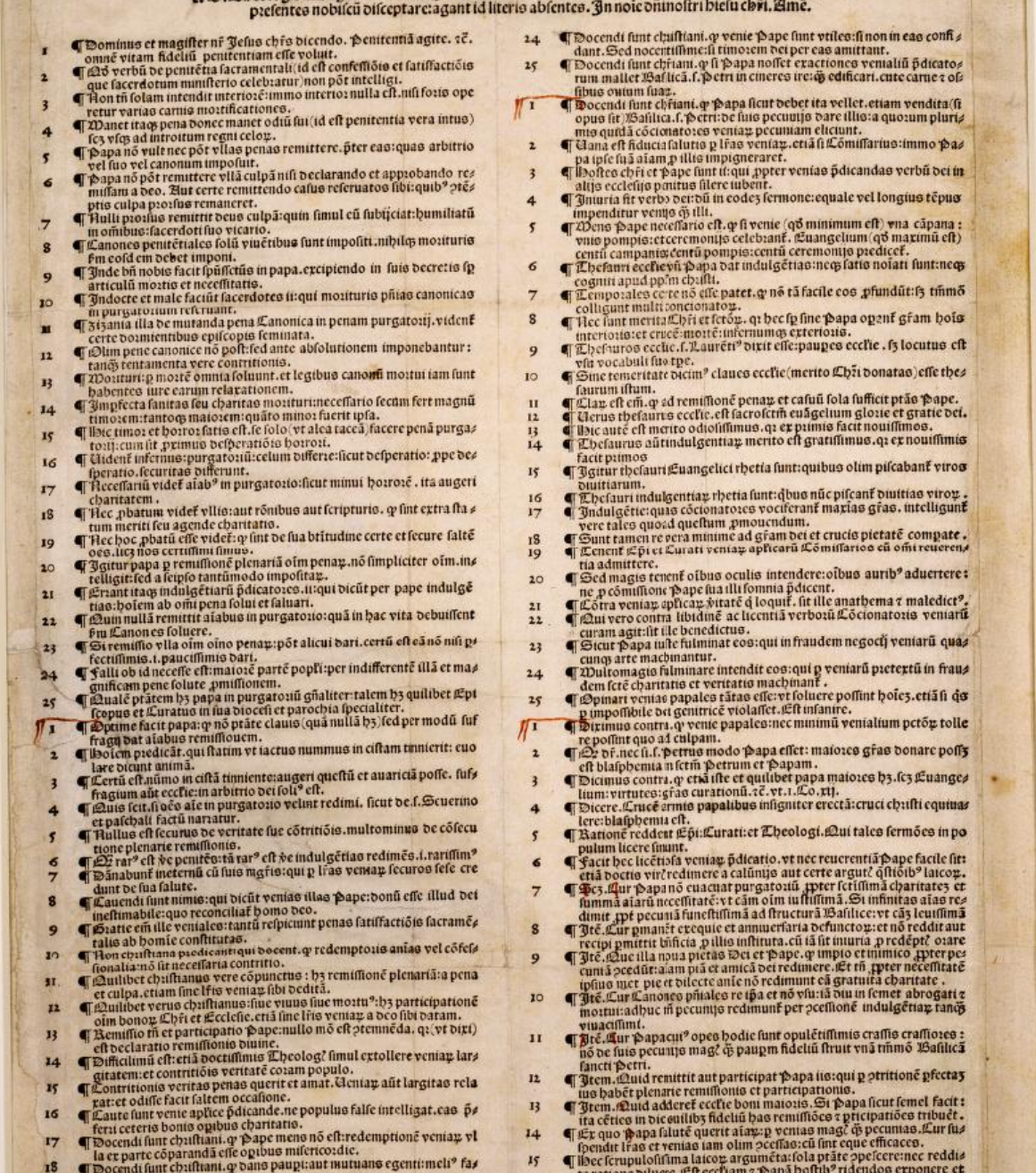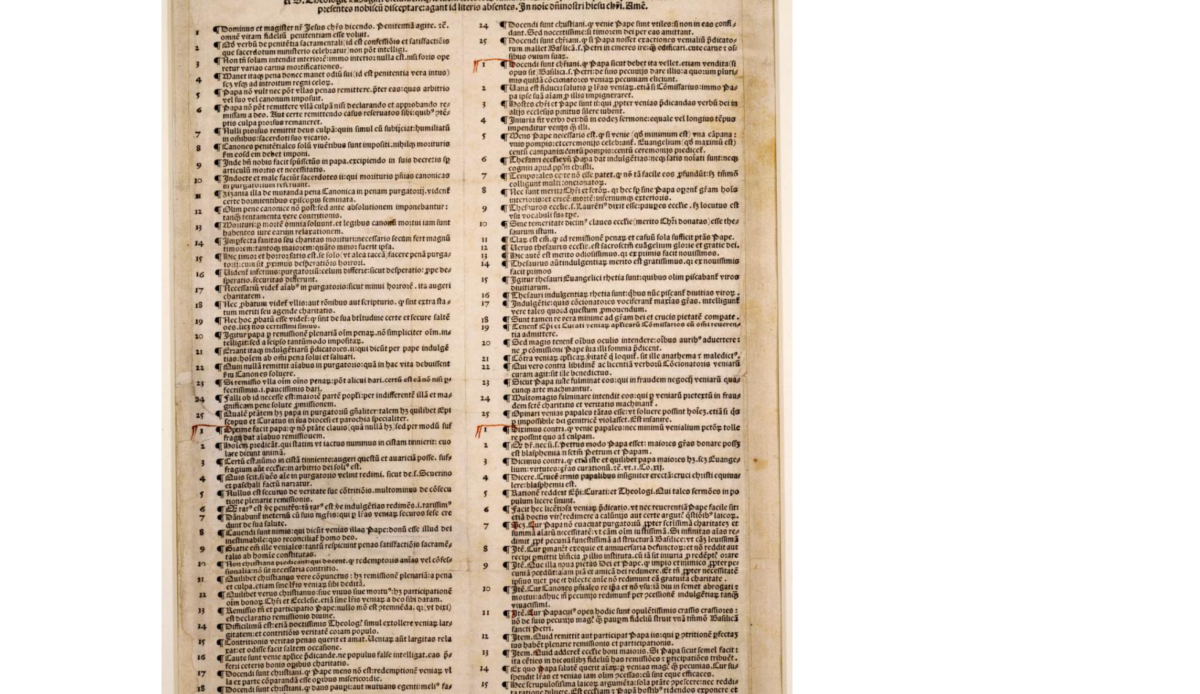
Luther, Martin, Author. Ninety-Five Theses. Nuremberg: Hieronymus Höltzel, 1517. Image. https://www.loc.gov/item/2021667736/
Co-missioners,
Suddenly we find ourselves in the final weeks of the current church year. A new one launches at the end of this month. The texts we hear in church between now and Christmas will crackle with news about the pending end of all things and the new beginning that God has already launched once and for all in Christ Jesus. If only that news would get the hearing it requires.
To that end we’re sending you a piece from our library in the hope that you’ll not only profit from it yourself but share it with others—preachers in particular if you dare. Ed Schroeder wrote it thirty-eight years ago. It appeared in the Spring, 1984 issue of Trinity Seminary Review (Vol. 6, No. 1) and was reprinted on our website with permission. Steve Hitchcock of our editorial team tinkered with it in recent weeks to make it more accessible for readers who aren’t familiar with the Latin catchphrases and theological-insider abbreviations that Ed was fond of using.
Ed’s stated topic is baptism and confession. His underlying target is a glibness about God’s attitude toward self-centered (aka sinful) humankind, more rampant in the church today than it already was when Ed wrote this. His goal—as ever with Ed—is to glorify Christ and comfort people who wonder whether a future with God is something they dare to hope for. God grant relief to you as you read—Part 1 today, Part 2 arriving next week.
A reminder that we gather this coming January to revel together in the promise of Christ. The occasion is our first Crossings Conference since 2020. Our topic is “The Promising Community.” The ELCA’s Presiding Bishop, Elizabeth Eaton, is one of the speakers we’ll be hearing from. Do join us! So much the better if you register at our website already this week so that we can get ready to welcome you.
Peace and Joy,
The Crossings Community
__________________________________________________________________
Baptism and Confession
by Edward H. Schroeder
The Reformation began with a call to reform the practice of repentance in the western church (see Luther’s 95 Theses). The ministry of Jesus and his predecessor John the Baptist started in the same way. John came “preaching a baptism of repentance for the forgiveness of sins.” After his arrest, says Mark, “Jesus came preaching… repent and believe the Gospel” (1:14f.).
In both the first and the sixteenth century, these calls to repentance were addressed to a people shaped by what, today, we would call civil religion—with “zeal for God,” as St. Paul puts it, “but not enlightened.” That is already one link between us and the renewal of repentance. The American people practice civil religion—perhaps in both church and state. The call of Christian ministry to reform the practice of repentance is also at hand.
This is especially true in view of the past few years of our national history. Were we to track the daily headlines with Luther’s antennae, we would soon notice that it is a time for repentance.
One of Luther’s most surprising treatments of repentance comes in his 1529 treatise “On War Against the Turk.”[1] The Turkish army, numbering hundreds of thousands, was outside the gates of Vienna. Luther’s antennae detected two enemies approaching the Holy Roman Empire. One was Suleiman the Magnificent. The other was God. Two very different enemies called for two very different defenses.
Since the Turk is the rod of the wrath of the Lord our God… the first thing to be done is to take the rod out of God’s hand, so that the Turk may be found only, in his own strength, all by himself, and without God’s hand…. This fight must be begun with repentance and we must reform our lives, or we shall fight in vain…for God is devising evil against us because of our wickedness and is certainly preparing the Turk against us as he says in Psalm 7, “If a man does not repent, God will whet his sword; he has bent and strung his bow; he has prepared his deadly weapons.”[2]
Luther anticipates that, in the eyes of experts, his military analysis and strategy “will be laughable for they will consider it a simple and common thing which they have long since passed beyond; nevertheless, I have not been willing to omit it for the sake of myself and of sinners like myself, who need both repentance and exhortation to repentance every day.”[3]
The last line signals what is central. Repentance? Who needs it? Sinners do. They need both repentance and exhortation to repentance every day. To explore what Luther means by this, I shall work from three Luther documents: The Large Catechism sections on Baptism and Confession, the corresponding articles from the Smalcald Articles, and Luther’s Explanations of the 95 Theses.
The Grammar of Confession
The New Testament term for confessing is homologia. It means “saying the same thing.” Thus to confess is to repeat, reiterate, “same-say” what someone else has already said. Fundamentally the stage-set for such same-saying is juridical, the forensic courtroom. In the courtroom, charges, claims, accusations, defenses, testimony, witness, yes, even confessions, are all made. Christian confessing occurs on such a stage-set. Confessing sin and confessing the faith, both of them, are same-saying back to the judge what someone else has first said about us to the court.
First the prosecutor. “Your honor, this one is a sinner according to your own law. Here is prima facie evidence.” Confessing sin is the accused concurring in the prosecutor’s statement, “same-saying” it out loud.
Then comes the defense attorney who, according to Revelation 12, appears before the bench as a Lamb that was slain and says: “Your honor, this accused is one for whom I died. Guilty indeed. But in my death for just such folks, justice, your justice, has already been done. Proleptically, you might say. Thus the accused is a candidate for acquittal.”
Says the judge: “How does the accused now plead?” In answer comes the “confession of faith,” same-saying the defense counselor’s words: “I confess that I am just such a one as the Lamb described. I plead the Lamb’s prior testimony. I trust that I am righteous propter Christum (because of Christ). He said I was.”
Today critical voices question the image of this forensic drama as mythology and suited to another age, not reflecting the sense of reality we have today. For Luther the juridical is not metaphor or image or symbol for something else. It is reality. Our lives must pass muster before the divine bench. Indeed, we are doing that day in and day out long before the final judgment. If you think you are on trial before your human associates day in and day out, then note well that this drama is performed on a human stage, behind which is the real back wall of the theater.
In front of that real wall is the divine bench, the cosmic judge, and your microcosmic drama on this mini-stage is actually being performed on the cosmic stage of the mega-courtroom. Just as there were two enemies confronting the empire at Vienna in Luther’s time, so there are two benches before which we practice and argue our own cases. Survival even in the mini-stage of daily routine life depends on how we make our confessions—both of them, of sin and of faith. That is of course true if and only if we are sinners. But if sinners, then we “need both repentance and the exhortation to repentance every day.”
Behind this bivocal confessionalism in Luther’s theology lies his “Eureka” encounter with the bivocality of God. One way he describes it is in a Table Talk selection from the winter of 1542-43:
For a long time I went astray and didn’t know what I was doing. To be sure, I was on to something, but I did not know what it really was until I came to the text in Rom 1:17, “He who through faith is righteous shall live.” That text helped me. There I saw what righteousness Paul was talking about. The word justitia struck out in the text. I connected the abstract notion of righteousness with the concrete phenomenon of being righteous, and finally understood what I had here. I learned to distinguish between the law’s kind of righteousness and that of the gospel. My previous reading was marred by but one defect in that I made no distinction between the law and the gospel. I regarded them to be identical and spoke as though there was no difference between Christ and Moses other than their location in time and their relative perfection. But when I found that distinction—that the law is one thing, and the gospel is something else–that was my breakthrough.[4]
Confessing sin and confessing faith are same-saying, saying yes to God’s word of law and God’s word of gospel addressed to me.
The Baptismal Basis of Both Confessions
In Luther’s Large Catechism the discussion of confession and absolution comes connected to baptism. Here, as in the Small Catechism, the fourth question about baptism asks about its character as a sign, what it signals for the future. Baptism puts a signpost on the baptized: This human being is signed up/signed in for a future of “sinking under and coming back up again…slaying the old Adam and resurrecting the new, both of which actions must continue in us our whole life long. Thus a Christian life is nothing else than a daily Baptism, once begun and ever continued…. This is the right use of Baptism.” Where this does not happen, “Baptism is not being used but resisted.”
Luther continues—
Here you see that Baptism, both by its power and by its signification [= pointer toward a particular future], comprehends also the third sacrament, formerly called Penance, which is really nothing else than Baptism. What is repentance but an earnest attack on the old man and an entering upon a new life? If you live in repentance, therefore, you are walking in Baptism, which not only announces this new life but also produces, begins, and promotes it. … Therefore Baptism remains forever. … Repentance, therefore, is nothing else than a return and approach to Baptism, to resume and practice what had earlier been begun but abandoned.
I say this to correct the opinion, which has long prevailed among us, that our Baptism is something past which we can no longer use after falling again into sin. We have such a notion because we regard Baptism only in the light of a work performed once for all. Indeed, St. Jerome is responsible for this view, for he wrote, “Repentance is the second plank on which we must swim ashore after the ship founders” in which we embarked when we entered the Christian church. This interpretation deprives Baptism of its value, making it of no further use to us. Therefore the statement is incorrect. The ship does not founder since, as we said, it is God s ordinance and not a work of ours. But it does happen that we slip and fall out of the ship. If anybody does fall out, he should immediately head for the ship and cling to it until he can climb aboard again and sail on as he had done before.[5]
The strangeness with which protestantized Lutherans in America generally greet the restoration of confession and absolution as regular parish ministry is undoubtedly linked to a strange notion of what baptism is. Now baptism is strange, but the strange notion of Christians today about it is an estranged notion, estranged from the daily double dipping that baptism signals right at the outset.
At the very end of the Large Catechism, Luther appended to the article on the Lord’s Supper another few paragraphs about confession. The last of those paragraphs begins: “Therefore when I urge you to go to confession, I am simply urging you to be a Christian. If I bring you to the point of being a Christian, I have also brought you to confession…. [By definition] Christians…want to be free from their sins, and happy in their conscience.”[6] Confession is all there in baptism, because what it means to be Christian is all there in baptism. The whole Christian ball of wax is about death and resurrection, Christ’s first, then ours. Renewal in baptismal piety is recovering the third sacrament.
Luther’s Proposal for Reforming the Confessional Sacrament
The hassle over indulgences was the tripwire that put the Wittenberg reformation onto the European map. Indulgences did not put forgiveness of sins up for sale. Indulgences were an alternate route—one might even say a pastorally better way, a grace-oriented way—of practicing the final and painful part of the penance sacrament as it had evolved in the medieval church. Here is Luther’s description of the sequence: It was “divided into three parts–contrition, confession, and satisfaction–with the added consolation that a person who properly repents, confesses, and makes satisfaction has merited forgiveness and has paid for his sins before God.”[7]
Indulgences came in at part three as an alternate form for making satisfaction. Indulgences were another route for balancing out the accounts that my sinful actions had messed up. Normal satisfactions were spelled out in the form of penalties: You hurt someone, so you should be hurt in return with some corresponding punishment. The pastoral task in designating satisfaction/punishments called for skill in “making the punishment fit the crime.” Indulgences were monetary penalties substituted for performance penalties: reasonable and performable.
Luther’s pastoral objection was not that money cannot buy forgiveness. That was true, but he saw the entire third sacrament in all its parts marred by something else. It was promoted under the rubric that the penitent “merits forgiveness and pays for his sins before God.” And what is so bad about that is Christological. In the Smalcald Articles, Luther walks through the traditional pastoral practice of each segment (contrition, confession, satisfaction) and comes up with the almost same conclusion over and over: “There was no mention here of Christ or of faith.”[8]
In his commentary to the famous Thesis 62 of the 95, Luther observed: “The Gospel…is not very well known to a large part of the church.”[9] In the Smalcald Articles, Luther links that to another theological vacuum in the church’s pastoral leadership: “It was impossible for them to teach correctly about repentance because they did not know what sin really is.”[10] Neither of God’s two words—Gospel or sin—is well known. No wonder confession needs reform. “Ignorance concerning sin and concerning Christ” are inseparable twins. This double ignorance, he complains, is at the bottom of the “thoroughly pagan doctrines” that call for reform.[11]
In 1973 the psychiatrist Karl Menninger cheered the hearts of many religious folks with his book entitled, Whatever Became of Sin?. It was a welcome new breeze in the wishy-washy psycho-sociological, analytical jungle that tended to track bad behavior back to cause-and-effect roots over which the perpetrators of wickedness had little or no control, and therefore could not rightly be held accountable. For a culture sliding toward structural non-accountability, Menninger’s was a protest with biblical groundings. But it was not about sin. It was at best about sins, about destructive behaviors for which human society should rightly hold the culprits accountable. Luther’s critique of scholastic theology on sin would implicate Menninger, too, as well as the moralistic/atomistic notion of sin at the center of American civil religion.
Sin is not something sinners do. It is something sinners are. Their doing is a consequence of their being. To borrow the formula from the Augsburg Confession, sinners “…are without fear of God, are without trust in God, and are concupiscent.”[12] They are non-listeners to, and consequently not same- sayers of, God’s word of critical analysis.
To be without fear of God is to refuse to confess God’s word of law as true about oneself. In addition, sinners are non-listeners—and consequently non-same-sayers—of God’s word of Christic gospel (non-confessors of trusting the promise); and in place of these two mega- missing factors, they are concupiscent, that is, the directional antenna of their lives is tuned in to some other signal, a signal that has them signed up and signed on for a very different future than the one God’s gospel has in mind for them.
Much sixteenth-century scholastic theology got no further than listing the fruits of sin. It did not probe for (or even become aware of) the root sin. Fruits, of course, are quite accessible; roots, not so easily. And so it is with sin. Root sin “is so deep a corruption of our being that reflective reason cannot understand it. It must be believed because of the revelation in the Scriptures.”[13]
Note well, people do not come to confess sin by self-analysis, however carefully done.
Confessing sin (“believing” that I am a sinner) comes from listening to God’s external word and responding by same-saying it. And which word of God is that? It is the word that non-God-fearers refuse to same-say: God’s word of critical exposure, God’s law.
The chief function or power of the law is to make original sin manifest and show humankind to what utter depths human nature has fallen and how corrupt it has become. So the law must tell us that we neither have nor care for God or that we worship strange gods–something we would not have believed before without the law’s exposing us.[14]
The directional signal of a sinner’s life is an arrow that is incurvatus in se (turned inward on oneself). I come to know that, says Luther, only by being told from the outside.
In Road to Reformation, a biography of Luther, Heinrich Boehmer contrasts the two views of sin in the Reformation controversy as longe a deo esse [to be distant from God] versus contra deum esse [to be against God]. It is not the case, says Luther, that our hearts are just separated by some distance from God and we need to be brought together again. Rather our hearts are moving in a contrary direction; the space between expands. Augustine is only half right: “Thou hast made us for thyself, and our hearts are restless till they find their rest in thee.” Our hearts are indeed restless because they are busily at work aiming at “rest” in everything but thee.
…to be continued
Endnotes
1 Luther’s Works (54 vols.; St. Louis: Concordia; Philadelphia: Fortress, 1955-76) 46. 155-205; hereafter cited as LW.
2 LW 46, 170-171.
3 Ibid., 172.
4 Author’s translation of Weimar Ausgabe, Tischreden V 210: 5518; also in LW 54, 442-43.
5 The Book of Concord: The Confession of the Evangelical Lutheran Church, ed. Theodore G. Tappert (Philadelphia: Fortress, 1959) 445-46, with author’s emended translation. Hereafter cited as BC.
6 BC, p. 460.
7 BC, p. 305.
8 Ibid; see also p. 306
9 LW 31, 230.
10 BC, p. 304.
11 BC, p. 303.
12 BC, p. 29.
13 BC, p. 302.
14 BC, p. 303.
Thursday Theology: that the benefits of Christ be put to use
A publication of the Crossings Community







You must be logged in to post a comment.